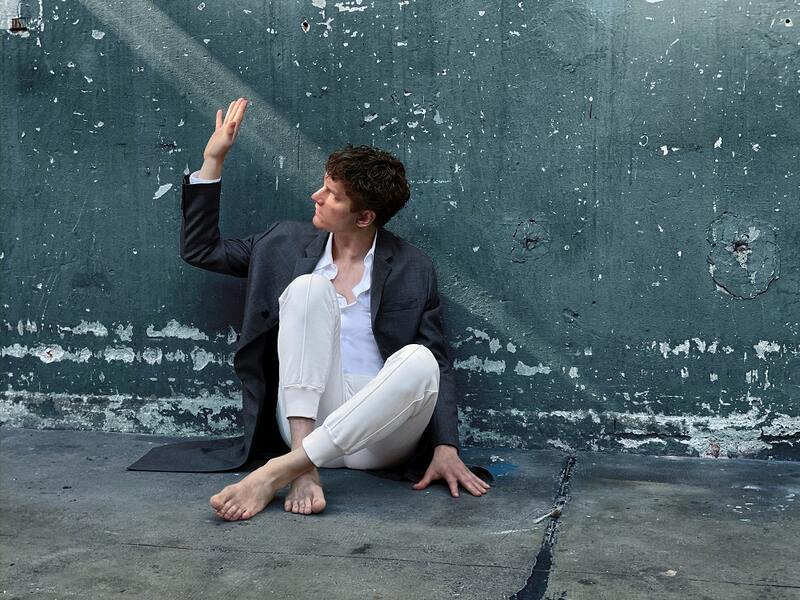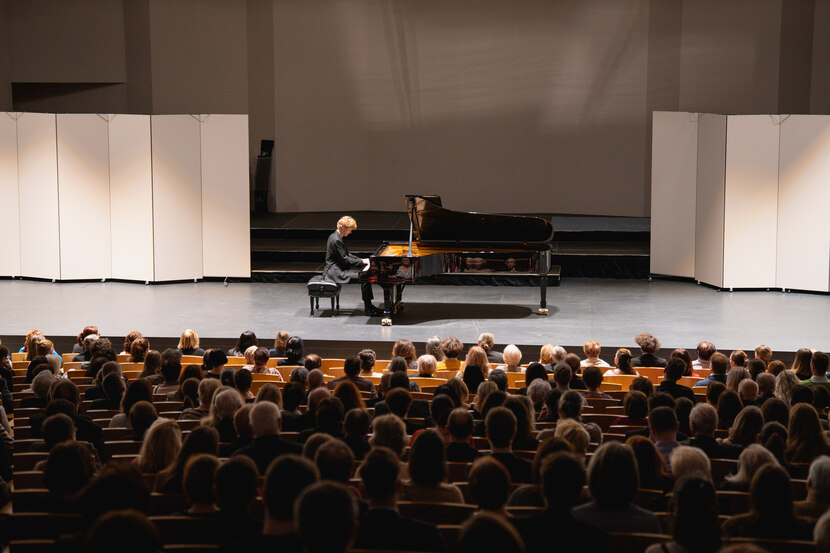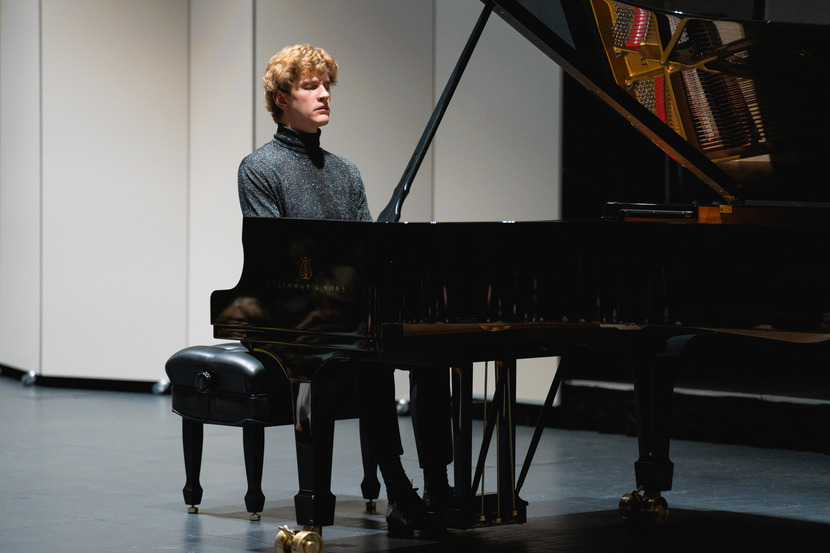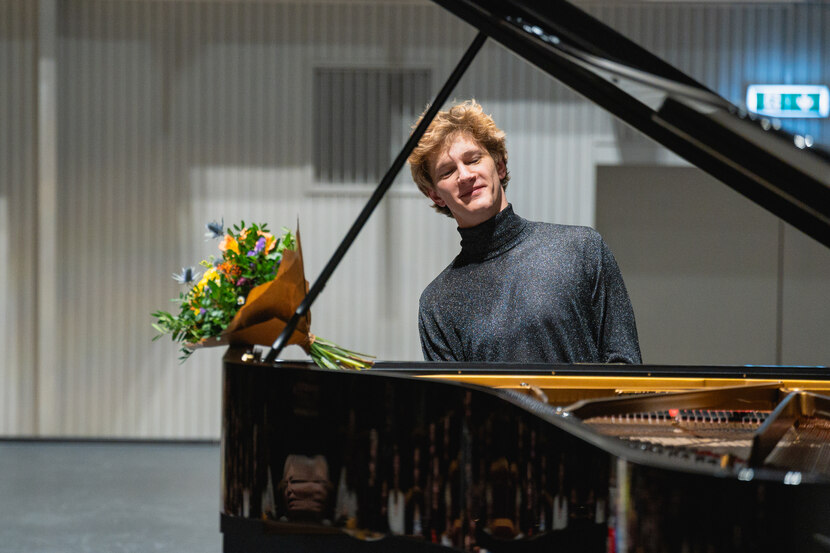Jan Lisiecki: I try to practice as little as possible
Jan Lisiecki, a young twenty-eight-year-old Canadian pianist of Polish descent, will visit Ostrava on 22 January 2024 to perform his programme as part of the Janáček Philharmonic Ostrava Piano Recital Series. On this occasion, he gave an interview to Opera PLUS.
Kristýna Petišková’s interview with the pianist Jan Lisiecki, taken from the internet daily operaplus.cz, 21 January 2024.

Thank you for taking the time to talk to me at 7:30 in the morning. I assume you have just woken up. Which brings me to my first question – do you ever have musical dreams?
Usually when I practise piano all day I sleep like a dead man and don’t even know I’m dreaming. I very rarely have interesting dreams. But when I’m not practising and I’m camping in the country with my dad, for example, I sometimes dream that I’m playing on stage. The strange thing is that I have these dreams in places that have nothing to do with music.
Can you think of a particular dream you can share?
In one dream that I particularly remember, I was playing Brahms’ Piano Concerto No. 1 on stage. It was strange because at the time I hadn’t played it for a long time and I hadn’t planned to.
Do you also consult autographs, and have you found a particular composer or song that enhances your vision or interpretation of the piece through the autograph?
Yes, in order to most faithfully convey a composer’s vision, I need an autograph to do so. But at the same time, that shouldn’t be the most important thing. In the end, what’s in the autograph doesn’t matter that much to the listener. I’m responsible for that. I have to study the autographs and I have to know how to present them. The audience that comes to the concert should no longer care about what note is in what place, whether it has a signature or not. If you make the performance into something analytical, in my opinion, the real art is lost, because the main thing is to share the music with others, not to present your analysis. It’s like theatre. If you’re an actor, you’re not presenting an analysis of Shakespeare’s Hamlet, but you’re fully immersed in the character.
How do you perceive the manuscripts of certain composers?
It’s fascinating to see the differences between Mozart, Chopin and Beethoven, for example. These are three composers whose manuscripts I spent a lot of time with. Mozart’s handwriting is fluid, uninterrupted. You get the feeling that he had this mad ability to compose everything at once as if he wasn’t thinking when he was composing, as if it was literally whatever was coming out of his head at the time. Beethoven’s manuscripts, on the other hand, are extremely chaotic.
I don’t envy the publishers who have to go through Beethoven’s manuscripts and come to a conclusion based on what’s in them.
With Chopin, on the other hand, I feel that he is a little more in control of his ideas; at least his manuscripts are very beautifully written and give a coherent, finished impression. I don’t think there’s anything to be taken out of them, or that there’s anything missing.

As you said, some of the manuscripts are very chaotic, others are organised and clear. Bach, for example, is famous for bending notes and phrases in his notation until they sometimes seem to be dancing.
Yes, but on the other hand, not everything in the music is what I use when I play. I try to take from the manuscripts what is important and what I feel I should share with the listener, but at the same time, while I don’t completely ignore some aspects, I leave them in the background.
It is not always common for performers to play from memory on stage. How do you do it, do you always play from memory at concerts or do you sometimes play from notes?
It depends. If I have a project with a lot of compositions, I take sheet music with me on stage, just in case, so that I don’t get stressed. The same goes for chamber music and some modern pieces.
On the other hand, when I’m playing something I know well, it’s liberating to play from memory. But even with pieces I’ve played for decades, like the Chopin concertos, which I think I know well enough to play in my sleep, memory can play tricks on me.
Maybe it’s not just about memory, but also about keeping the composition fresh. Do you ever alternate between playing from memory and from notes, so that you can see and hear the music from a different perspective?
In general, as soon as I have learned something by heart, I practise it from memory. But there usually comes a point when I have to go back to the sheet music to check exactly what it says. Especially with pieces that I play often and for a long time, I find that I realise how far I’ve strayed from the notes, that I’ve created my own version of the piece in my head over time.
Are you also interested in historically informed interpretation? Different tuning systems or period instruments?
Yes, I have even played historical instruments. But at some point, I realized that it would be too complicated for me to pursue early music fully while continuing to play more recent music. I would have had to get other instruments for my home and the time commitment would have been almost unmanageable. Also, I think it’s unhealthy for a player to switch between playing modern and historical instruments. They’re very different. It’s crazy to imagine playing Prokofiev’s Piano Concerto on a modern piano one night and having to play Mozart’s Piano Concerto on a hammer piano the next day.
Plus – this is sort of a personal problem – playing historical instruments is incredibly uncomfortable for me. I’m just too tall for some historical piano from the 1800s. Even behind a modern piano, I can barely fit. Of course, this could be solved somehow, but it would be an extra complication for me.
Since you mentioned physical comfort at the piano, do you concentrate on your posture while playing? Do you experiment with different positions?
After thousands and thousands of hours of practice, I can play in pretty much any position. I know how to distribute the weight of my body to play the best I can. Sure, some positions are more comfortable than others, but playing with my body under the piano probably wouldn’t be the most comfortable.

How do you choose a piano for a concert where you play pieces by different composers? I can imagine that when you play, for example, at the upcoming Preludio concert, there will be so many different pieces, so many different colours to work with. And when you’re choosing a piano, you probably just have to compromise, right? With colors…
Yes. I often have to compromise and sometimes I don’t even have a choice. It also happens that even when I have a choice, none of the pianos fit me. But there’s nothing I can do about it, it’s part of the pianist’s destiny. We often have to adapt to different instruments. It can be a burden, but at the same time, it has its advantages. Because you have to play differently, play with different colours, emphasise the bass or, on the contrary, you have to pay attention to the high notes. The result may not be exactly to your liking, but it will be completely new again, you will hear the song with “new ears”.
Let’s say you can’t change the piano you play, but you do adapt it to the acoustics of the hall. And when you play it and you test the acoustics and the volume limits and so on, then of course you hear it differently than the people at the back of the hall. How do you deal with that? Do you have an assistant to help you listen to what it sounds like in different parts of the hall?
I usually rely on my own experience. I’ve performed in a lot of venues and I know what the acoustics are like. The Elbe Philharmonic in Hamburg, for example, is famous for its acoustics on stage – you can hear what’s being played so accurately that it’s sometimes uncomfortable. This applies to solo or chamber playing. But when I’m playing with an orchestra, sometimes I’m not sure, so I ask someone to record us from the audience during rehearsal, a little bit at least, even on the recorder on my phone. So I know how well the audience can hear me in the back of the hall. Sometimes I get confirmation of what I thought, other times I get surprised, and we have to work on balancing the sound with the orchestra.
What about concentration on stage, does it bother you if someone in the audience coughs for example?
I can’t say that nothing has ever bothered me. I try to do my best, but of course, there are times when I’m a little more nervous or I can’t concentrate 100%. And as for coughing at concerts, it happens that when I play a nocturne, for example, just at the most beautiful, intimate, tender moment, suddenly someone has a violent coughing fit. In such moments I try not to react directly to the cough, because that would make the whole situation worse, but rather to the loss of attention of the audience. I’ll start playing a little differently, for example, I’ll intensify the next passage in the composition, or I’ll speed up the tempo, in short, I’ll play more expressively to bring the listener back “into the game”.
How do you put together your concert programmes?
I plan my programmes several years in advance. I’ve only just started this year’s programme, but people are already asking me for next year’s programme. It often happens that I put together a program, but I end up postponing it because I don’t like something about it or I don’t feel like playing it. But after a while, I come back to it and try to tweak it, improve it. Sometimes that can take an hour, sometimes it can take months. And sometimes I’ll go for months with a vague idea, but then one day I’ll sit down and within moments I’ll have it done. Like the Nocturne and Etudes program. At first, I intended to put together just the Nocturnes in one program – Chopin’s Nocturnes, Paderewski’s Nocturne, Debussy’s Nocturne, and a few others – but when I wrote them down, I told myself I couldn’t do that because I would bore the listener to death. So I thought I’d combine them with etudes. I put them together by key, and within half an hour I had the whole program ready.
I wonder how it was with your teachers. You probably didn’t choose your first teacher. But how did it go from there? If I remember correctly, in an interview you said that you even flew to one teacher, about once every two months. If that’s the case, why did you choose that particular teacher, because of his experience or his method of playing?
I was lucky to stumble upon good teachers in my early days. They taught me how to play technically, but at the same time, they allowed me freedom of expression. I learned what I needed to learn from my teachers in Calgary. But when I signed with Deutsche Grammophon at about 15, started touring and spending a lot of time on the road, I decided to be my own teacher. When I was deciding where and with whom to study at university, I discovered a Canadian teacher, Marc Duval. Although he is brilliant and highly respected in Canada, he is not well-known in the world, he doesn’t try to make himself known. It’s a Canadian way of living. I used to fly to see him once every two months. I always came up with some new repertoire, often it was music for maybe two hours of pure time. Although I didn’t see him very often, our lessons lasted eight hours. I learned a lot from him, especially in terms of sound production. Thanks to him I can shape the sound, play softly, maintain a similar sound quality in pianissimo and fortissimo, and he also taught me how to work with silence. But then I finished my degree, he retired, and since then I’ve been my own teacher again. And I’m glad for that. I feel good about the fact that I had to figure out a lot of things on my own and that nobody “held my hand”.
Do you ever give your own masterclasses or do you think about teaching in the future?
Yes, I do give masterclasses from time to time. When I was younger, it was for the less demanding. My students were the same age or even older than me. I advised them, but at the same time I didn’t want it to look like I was something more than them, that I was above them. It’s easier now, I’m a little older. But it’s often difficult to juggle it with touring. I do about a hundred gigs a year. So when I’m not performing, preparing for a gig or flying somewhere for another gig, I like to be able to relax when I have a day off. But this year it’s going to work out, I’ve already got some classes scheduled.

Doesn’t it bother you that in a masterclass you only have one lesson, one session with a student? For example, would you like to have students in the future that you could work with more in-depth and for longer periods?
I think I would be a good teacher, but I haven’t thought about it too much yet. I enjoy performing, and I still have a lot to learn about music and about what I am like, what my relationship with music is.
You also said that being a pianist is not the only thing that characterizes your personality. I know that, for example, you’re a good photographer. I was looking at your Instagram, and I find your photographs not only beautiful but technically perfect. Are you a self-taught photographer, or how did you get into photography?
I’m self-taught, I’ve been taking photos since I was a kid. I love photography, it allows one to see things from a different perspective. My mother is also a very good photographer. Sometimes we even have competitions to see who can take the best picture of something.
You also revealed in an interview that your secret passion is writing, that when you have free time you like to write. And I wonder what kind of writing that is.
Yes, that’s true. Mostly I write about my travel experiences, what happens to me on the road, or what catches my eye. They’re actually little travelogues that I always like to come back to after a while, and I often relive some incidents that I would otherwise have forgotten.
Inspiration from different art forms – it sounds like a cliché, but I’ll ask you anyway – do you draw inspiration from somewhere?
My biggest inspiration is nature, I find absolute beauty and perfection in it. I think all art, whether it’s composition or any other art form, tries to emulate the perfection and beauty of nature. By performing in different places, I can visit all kinds of museums and galleries. And even in places I return to repeatedly, I often discover something new. For example, a month ago in Paris, I discovered the museum of the sculptor Paul Landowski, who designed the statue of Christ the Redeemer in Rio de Janeiro. Suddenly I started to see the statue with new eyes. I saw it not as a tourist attraction, but as a valuable work of art.
You noted that you try to practice as little as possible, for many reasons. Could you give an effective technique you have developed to save time and get the most out of practice?
It’s important for me to have a good schedule of what, when and how I practice. That then naturally determines how much I need to learn at that particular time. It’s different for every composition. For example, in terms of memory. Sometimes it’s easy, I just have to play the notation a few times to learn the song by memory. For more difficult compositions, it’s more difficult, it takes more effort. But having a set number of hours you have to practice every day doesn’t make sense to me. So, I practice as much as I need to, but basically as little as possible. And also, if possible, I like to practice on the piano, which I will play later in a concert. When I have a solo recital, I prefer to play the whole concert program on it before the concert, every piece at least once. Sometimes during the playing, I’ll adjust something, work on something else, usually for about two hours.
Does that imply that you’re probably a naturally organised type of person? I wonder if you ever sing while you play the piano?
Yeah, I’d say I’m naturally organised. And as for singing, yes, I sing, but only in my imagination, inaudibly. It doesn’t help me to sing out loud. Of course, with Chopin’s music, for example, you have to bend phrases melodically, sing them out, which goes a bit against the nature of the piano as a percussive instrument. But I’d hate to get to a point where I’m singing out loud on stage like, say, Glenn Gould. It’s tempting to hum loudly while playing – I say hum because he’s not really singing. It seems to me that in those cases you’re more likely to try to force the melody in a different way.
Now I would like to ask you about your wishes for the future. For example, would you like to collaborate with other pianists, to play with them four-handed?
Yes, I would like to play with a lot of pianists. I have worked with some of them in the past, for example with Maria João Pires or Christian Zacharias. Basically, if I want to collaborate with someone and it’s planned well, it usually works out eventually.
And are there still some compositions that you have so much respect for that you don’t dare to play them?
I have respect for all the compositions. But yes, for example, Prokofiev’s Second Piano Concerto I had a lot of respect for when I went into it. It’s such a fearsome monster with a terrible reputation. Just because of that, one approaches it with fear. I’m wondering how to answer that completely honestly because I currently have a program planned for the next three years, so I know I won’t be learning, for example, Brahms’ Second Piano Concerto or Rachmaninoff’s Third Piano Concerto in the following years. So yes, there are pieces that I approach with more caution, pieces that I know will take me more time to prepare.
In a few days you will play in Ostrava for the first time, are you looking forward to it?
Yes. I like visiting new places, letting the culture influence me, visiting monuments. And I’m also looking forward to meeting the audience and walking around the city.
Ostrava is building a new concert hall, what do you think it will bring to the city and its culture?
A new concert hall can revive the community and stimulate interest in classical music among the wider public – not to mention that it’s great for us performers to perform in brand new halls!
The Janáček Philharmonic Orchestra Ostrava is celebrating its 70th anniversary this year. Is there anything you would like to wish them?
Another 70 years of making music, inspiration and joy!
My last question is about language and the emotions associated with it. I was impressed by a long interview with you in which you spoke Polish. As a Czech, I understood most of what you said. I enjoyed the interview very much, but why am I talking about it – it seemed to me that when you speak Polish you seem more extroverted than when you speak English. Do you feel different in different languages?
Yes, I feel different in each language. It’s quite interesting because the way I express myself in different languages is also different. Although it’s also different. There are days when I am more serious, more focused, and other days when I feel relaxed and happy. At the same time, when I compare English and Polish, I use each language for different purposes. English is my everyday working language. Polish, on the other hand, I associate with my family, it is more familiar to me. I also feel that I have a different voice in each language.
Do you mean a different intonation?
I know from my own experience that when I speak English my voice is much higher because my vocal chords probably don’t feel comfortable, they got used to Czech.
In Polish, my voice is higher. But it’s not because I don’t feel as comfortable in it as I do in English. On the contrary, it’s because it’s more familiar to me.
Thank you and I hope that music will continue to inspire you and that you will continue to inspire others.
Thank you very much. It was my pleasure.

